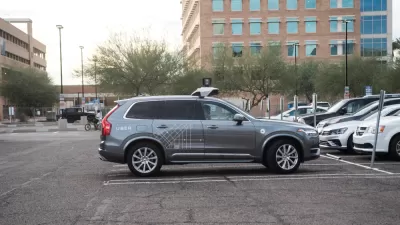Gabe Klein thinks a proposed ban on self-driving cars in Chicago is shortsighted.

John Greenfield recently interviewed Gabe Klein, former transportation chief of the city of Chicago and author of Start-Up City, on the subject of a proposal in Chicago to ban self-driving cars.
Meg Graham reported on the proposed ban in September, in case you missed that story. "Aldermen Ed Burke and Anthony Beale proposed the ordinance Wednesday in a City Council meeting, calling it a 'preemptive strike' after Uber’s announcement it was beginning a pilot of self-driving cars," wrote Graham at the time. The aldermen were unprepared to allow Chicago streets to conduct the "experiment" currently ongoing in Pittsburgh.
Klein's take on the proposed regulation, however, is that the current system of "people-drive cars" is unacceptable. In Klein's own words: "the idea that self-driving cars are going to be less safe is almost impossible. Human error causes 94 percent of car crashes, so the faster we can get people out from behind the wheel of [multi-ton] hunks of metal next to pedestrians and cyclists, the safer our cities will be, the more people will want to live in our cities, the safer and healthier our children will be, because they’ll start walking and biking to school again."
Klein and Greenfield discuss the potential of self-driving cars in much detail—including the role of the taxi industry in opposing self-driving cars in Chicago, the idea that autonomous vehicles will encourage sprawl, and the recently announced federal regulations for self-driving cars.
FULL STORY: Ex-CDOT Chief Klein Discusses Proposed Ban on Self-Driving Cars in Chicago

Alabama: Trump Terminates Settlements for Black Communities Harmed By Raw Sewage
Trump deemed the landmark civil rights agreement “illegal DEI and environmental justice policy.”

Study: Maui’s Plan to Convert Vacation Rentals to Long-Term Housing Could Cause Nearly $1 Billion Economic Loss
The plan would reduce visitor accommodation by 25% resulting in 1,900 jobs lost.

Planetizen Federal Action Tracker
A weekly monitor of how Trump’s orders and actions are impacting planners and planning in America.

Waymo Gets Permission to Map SF’s Market Street
If allowed to operate on the traffic-restricted street, Waymo’s autonomous taxis would have a leg up over ride-hailing competitors — and counter the city’s efforts to grow bike and pedestrian on the thoroughfare.

Parklet Symposium Highlights the Success of Shared Spaces
Parklets got a boost during the Covid-19 pandemic, when the concept was translated to outdoor dining programs that offered restaurants a lifeline during the shutdown.

Federal Homelessness Agency Places Entire Staff on Leave
The U.S. Interagency Council on Homelessness is the only federal agency dedicated to preventing and ending homelessness.
Urban Design for Planners 1: Software Tools
This six-course series explores essential urban design concepts using open source software and equips planners with the tools they need to participate fully in the urban design process.
Planning for Universal Design
Learn the tools for implementing Universal Design in planning regulations.
Caltrans
Smith Gee Studio
Institute for Housing and Urban Development Studies (IHS)
City of Grandview
Harvard GSD Executive Education
Toledo-Lucas County Plan Commissions
Salt Lake City
NYU Wagner Graduate School of Public Service




























